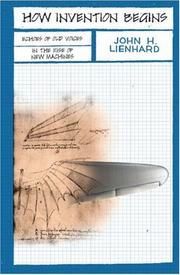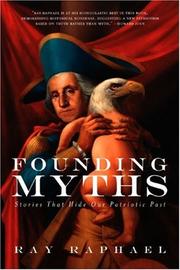| Listing 1 - 10 of 621 | << page >> |
Sort by
|

ISBN: 1280846518 0198041721 1429420545 9781429420549 9780198041726 9781280846519 019530599X 9780195305999 9780195341201 0195341201 019530599X 9780195305999 0199885567 Year: 2006 Publisher: Oxford ; New York : Oxford University Press,
Abstract | Keywords | Export | Availability | Bookmark
 Loading...
Loading...Choose an application
- Reference Manager
- EndNote
- RefWorks (Direct export to RefWorks)
Invention--that single leap of a human mind that gives us all we create. Yet we make a mistake when we call a telephone or a light bulb an invention, says John Lienhard. In truth, light bulbs, airplanes, steam engines--these objects are the end results, the fruits, of vast aggregates of invention. They are not invention itself. In How Invention Begins, Lienhard reconciles the ends of invention with the individual leaps upon which they are built, illuminating the vast web of individual inspirations that lie behind whole technologies. He traces, for instance, the way in which thousands of people
Inventions --- History.
Book
ISBN: 2830700759 9782830700756 Year: 1989 Publisher: Genève: Minerva,
Abstract | Keywords | Export | Availability | Bookmark
 Loading...
Loading...Choose an application
- Reference Manager
- EndNote
- RefWorks (Direct export to RefWorks)
Inventions --- Machinery
Book
ISBN: 150992034X 1509920323 9781509920334 1509920331 9781509920327 9781509920310 Year: 2018 Publisher: Oxford, UK ; Portland, Oregon : Hart Publishing,
Abstract | Keywords | Export | Availability | Bookmark
 Loading...
Loading...Choose an application
- Reference Manager
- EndNote
- RefWorks (Direct export to RefWorks)
"Although employers are required to pay compensation for employee inventions under the laws in many countries, existing legal literature has never critically examined whether such compensation actually gives employee inventors an incentive to invent as the legislature intends. This book addresses the issue through reference to recent, large-scale surveys on the motivation of employee inventors (in Europe, the United States and Japan) and studies in social psychology and econometrics, arguing that the compensation is unlikely to boost the motivation, productivity and creativity of employee inventors, and thereby encourage the creation of inventions. It also discusses the ownership of inventions made by university researchers, giving due consideration to the need to ensure open science and their academic freedom. Challenging popular assumptions, this book provides a solution to a critical issue by arguing that compensation for employee inventions should not be made mandatory regardless of jurisdiction because there is no legitimate reason to require employers to pay it. This means that patent law does not need to give employee inventors an 'incentive to invent' separately from the 'incentive to innovate' which is already given to employers."--Bloomsbury Publishing.
Book
ISBN: 1587655233 1587655241 1587655268 1780341423 1587655292 9781587655296 9781587655227 1587655225 9781587655234 9781587655241 9781587655258 158765525X 9781587655265 9781780341422 Year: 2009 Publisher: Pasadena, Calif. : Salem Press,
Abstract | Keywords | Export | Availability | Bookmark
 Loading...
Loading...Choose an application
- Reference Manager
- EndNote
- RefWorks (Direct export to RefWorks)
Provides in-depth critical essays on important men and women inventors of all time, from around the world.
Inventors --- Inventions --- History.
Book
ISBN: 1486300332 1486300324 9781486300327 9781486300334 9780643094277 064309427X Year: 2014 Publisher: Collingwood, Victoria : Csiro Publishing,
Abstract | Keywords | Export | Availability | Bookmark
 Loading...
Loading...Choose an application
- Reference Manager
- EndNote
- RefWorks (Direct export to RefWorks)
'Have you got any ideas on how to make a better banknote?'In the late 1960s, the detection of counterfeit banknotes and the rise of new photographic and copying technologies prompted the Reserve Bank of Australia to explore options for increasing the security of currency. A top-secret research project, undertaken by CSIRO and the Bank, resulted in the development of the world's first successful polymer banknotes. This technology is now used in over 30 countries.This book describes the story of the Currency Notes Research and Development project from its inception in 1968 through to the release
Bank notes --- Inventions --- Polymers.
Book
ISBN: 174332250X 9781743322505 9781743322512 1743322518 9781743323571 1743323573 Year: 2013 Publisher: University of Sydney
Abstract | Keywords | Export | Availability | Bookmark
 Loading...
Loading...Choose an application
- Reference Manager
- EndNote
- RefWorks (Direct export to RefWorks)

ISBN: 0415036097 9780415036092 Year: 1990 Publisher: London: Routledge,
Abstract | Keywords | Export | Availability | Bookmark
 Loading...
Loading...Choose an application
- Reference Manager
- EndNote
- RefWorks (Direct export to RefWorks)
History --- Oral history --- Errors, inventions, etc. --- Congresses. --- Errors, inventions, etc --- History - Errors, inventions, etc. - Congresses --- Oral history - Congresses

ISBN: 9781595580733 1595580735 9781565849211 1565849213 Year: 2004 Publisher: New York (N.Y.) New Press
Abstract | Keywords | Export | Availability | Bookmark
 Loading...
Loading...Choose an application
- Reference Manager
- EndNote
- RefWorks (Direct export to RefWorks)
Book
ISBN: 1786608308 9781786608307 9781786608284 Year: 2018 Publisher: Lanham, Maryland : Rowman & Littlefield International,
Abstract | Keywords | Export | Availability | Bookmark
 Loading...
Loading...Choose an application
- Reference Manager
- EndNote
- RefWorks (Direct export to RefWorks)
The contributors to this volume argue that whilst there is a commonplace superstition conspiracy theories are examples of bad beliefs (and that the kind of people who believe conspiracy theories are typically irrational), many conspiracy theories are rational to believe: the members of the Dewey Commission were right to say that the Moscow Trials of the 1930s were a sham; Woodward and Bernstein were correct to think that Nixon was complicit in the conspiracy to deny any wrongdoing in the Watergate Hotel break in; and if we either accept the terrorist events of 9/11 were committed by Al-Qaeda, or that the Bush Administration was responsible, then it seems we are endorsing some theory about a conspiracy to commit an act of terror on American soil. As such, there is no reason to reject conspiracy theories sui generis. This volume challenges the prima facie that conspiracy theories are irrational beliefs, arguing that we should treat conspiracy theories and the phenomena of conspiracy theories seriously. It presents fresh perspectives from the wider philosophical, sociological and psychological community on what is becoming an issue of increasing relevance in our time.
Conspiracy theories --- History --- Philosophy. --- Errors, inventions, etc.
Book
ISBN: 1283142295 1443827770 9786613142290 9781443827775 9781283142298 1443826499 9781443826495 Year: 2011 Publisher: Newcastle upon Tyne : Cambridge Scholars Pub.,
Abstract | Keywords | Export | Availability | Bookmark
 Loading...
Loading...Choose an application
- Reference Manager
- EndNote
- RefWorks (Direct export to RefWorks)
Pericles, famed general and foremost political leader of Athens during her glory days of the 5th century, brought about the downfall of the Athenian empire almost single-handedly. This truth, obvious to contemporary Greeks, is today not generally understood, and we have Thucydides and his History of the Peloponnesian War to thank for the confusion. That Thucydides, a fierce partisan of Pericles and a soldier exiled for his own military misadventures, should wish to reinvent the history of tha...
Thucydides. --- Greece --- History --- Historiography. --- Errors, inventions, etc.
| Listing 1 - 10 of 621 | << page >> |
Sort by
|

 Search
Search Feedback
Feedback About UniCat
About UniCat  Help
Help News
News